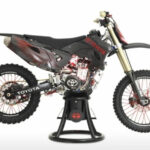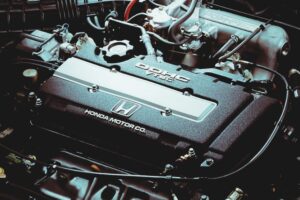Toyota is a well-known Japanese automotive manufacturer that has been producing cars for over 80 years. One of the key features of Toyota engines is that they come in both interference and non-interference types.
An interference engine is one where the valves and pistons occupy the same space, and if the timing belt or chain breaks, the engine will suffer severe damage.
On the other hand, a non-interference engine is one where the valves and pistons do not occupy the same space, and if the timing belt or chain breaks, the engine will not suffer severe damage.
Toyota has produced a number of non-interference engines over the years, which are known for their durability and reliability. These engines include the 1.5L, 1.6L DOHC Non-Interference (Valves), 1.6L SOHC, 1.8L 7AFE, 4AFE, 4AF, 2.0L, 2.2L, and 2.5L.
Other car manufacturers such as Subaru, Suzuki, Volkswagen, and Volvo also produce non-interference engines. It is important to note that while non-interference engines are generally more reliable, they still require regular maintenance and care to ensure their longevity.
Understanding Toyota Engines
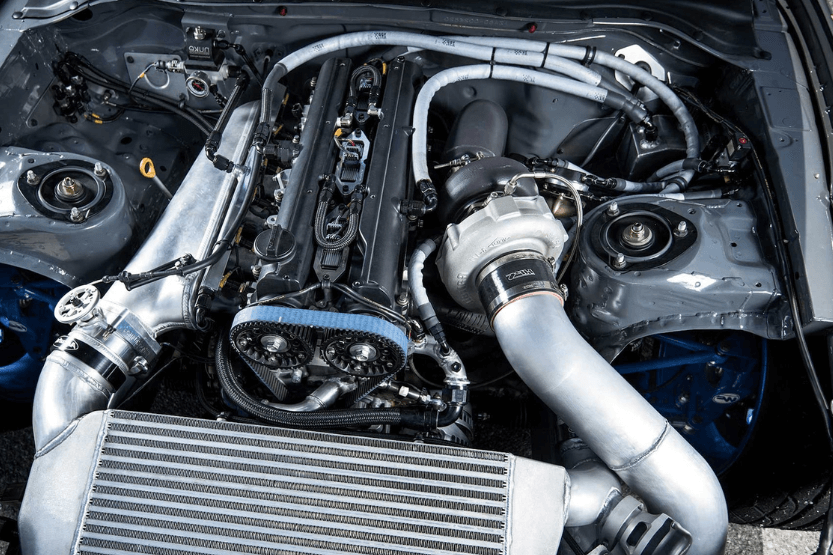
Toyota is known for producing reliable and long-lasting engines. Toyota engines are available in different configurations, including V6, SOHC, DOHC, and more. One of the most important things to note about Toyota engines is whether they are interference or non-interference.
Interference engines are those in which the valves and pistons can come into contact if the timing belt or chain fails.
This can cause significant damage to the engine and require costly repairs. In contrast, non-interference engines have enough clearance between the valves and pistons that they will not collide if the timing belt or chain fails.
Toyota has produced a range of non-interference engines, including the 1.5L, 1.6L DOHC, 1.8L, 2.0L, 2.2L, and 2.5L engines. These engines are known for their durability and longevity.
One popular non-interference engine from Toyota is the 1.6L DOHC engine found in the Toyota Corolla and Celica. This engine offers good power and fuel efficiency, making it a popular choice for many drivers.
In addition to non-interference engines, Toyota has also produced a range of interference engines. These include the 3.0L V6, 3.0L inline 6 VVT-i (1998 2JZ-GE), 3.0L inline 6, 3.4L, 3.5L V-6, 4.7L, and 3.3L 3MZ-FE V6 w/ VVT-i engines.
It’s important to note that some Toyota engines, such as the 1A-C and 3A-C engines, are interference engines in some markets but non-interference engines in others. It’s always a good idea to check the specific engine in your vehicle to determine whether it is interference or non-interference.
Based on my research, Toyota engines are known for their reliability and durability. Whether you have a non-interference engine or an interference engine, proper maintenance and timely repairs can help ensure that your Toyota engine lasts for many years to come.
Non-Interference Vs Interference Engines
When it comes to engines, there are two main types: interference and non-interference engines. The main difference between these two types of engines is what happens if the timing belt breaks.
In an interference engine, the timing belt is responsible for keeping the pistons and valves moving in sync. If the timing belt breaks, the pistons and valves can collide, causing serious damage to the engine.
As per Napa Auto Parts, interference engines have an advantage over non-interference engines as they offer improved breathing capability. This means that the valves in interference engines can open earlier, close later, and open wider, resulting in better performance.
Additionally, interference engines can achieve higher compression ratios, leading to increased power output, improved fuel efficiency, and reduced emissions.
In contrast, a non-interference engine has enough clearance between the pistons and valves that they won’t collide if the timing belt breaks.
Toyota has both interference and non-interference engines in their lineup. The non-interference engines are generally considered to be more reliable, as they are less likely to suffer catastrophic engine damage if the timing belt breaks.
Some of the Toyota non-interference engines include the 1.5L (3E-E & 5E-FE), 1.6L DOHC Non-Interference (Valves), 1.6L SOHC, 1.8L 7AFE, 4AFE, 4AF, 2.0L, 2.2L, and 2.5L engines.
On the other hand, Toyota interference engines are designed with tighter tolerances between the pistons and valves, which can lead to significant engine damage if the timing belt breaks.
Some of the Toyota interference engines include the 1.5L (1NZ-FE), 1.6L (4A-GE), 1.8L (1ZZ-FE), 2.0L (3S-GE), 2.4L (2AZ-FE), and 3.0L (1MZ-FE) engines.
It’s important to note that just because an engine is an interference engine doesn’t mean it’s unreliable. In fact, many of the most popular engines on the market are interference engines.
However, it’s crucial to stay on top of your engine’s maintenance schedule and replace the timing belt at the recommended intervals to avoid any potential issues.
In summary, non-interference engines are generally considered to be more reliable than interference engines because they are less likely to suffer catastrophic engine damage if the timing belt breaks.
Toyota has both interference and non-interference engines in their lineup, and it’s important to stay on top of your engine’s maintenance schedule to ensure it stays running smoothly.
Specific Toyota Engine Models
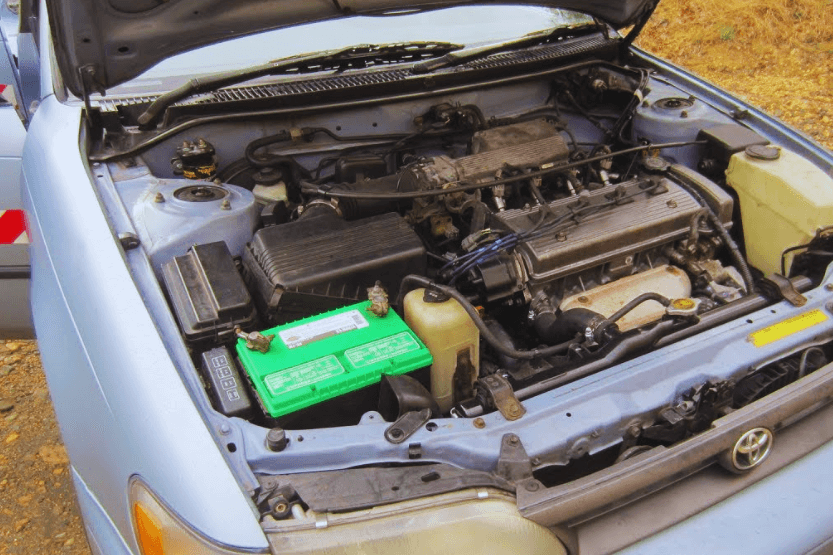
Toyota has produced a wide range of non-interference engines over the years, including some that are still in use today. Here are some specific Toyota engine models that are known to be non-interference:
- 4A-F: This 1.6L SOHC engine was used in the Toyota Corolla from 1987 to 1992. It is a non-interference engine, which means that the valves and pistons will not collide if the timing belt breaks.
- 4A-GE: The 4A-GE is a 1.6L DOHC engine that was used in the Toyota Corolla GT-S and the Toyota MR2 from 1985 to 1991. It is a non-interference engine, which means that the valves and pistons will not collide if the timing belt breaks.
- 4A-GZE: This 1.6L DOHC engine was used in the Toyota MR2 Supercharged from 1988 to 1995. It is a non-interference engine, which means that the valves and pistons will not collide if the timing belt breaks.
- 4A-FE: The 4A-FE is a 1.6L DOHC engine that was used in the Toyota Corolla from 1993 to 1997. It is a non-interference engine, which means that the valves and pistons will not collide if the timing belt breaks.
- 7AFE: This 1.8L DOHC engine was used in the Toyota Corolla from 1993 to 1997. It is a non-interference engine, which means that the valves and pistons will not collide if the timing belt breaks.
- 4AFE: The 4AFE is a 1.6L DOHC engine that was used in the Toyota Corolla from 1993 to 1997. It is a non-interference engine, which means that the valves and pistons will not collide if the timing belt breaks.
- 4AF: This 1.6L SOHC engine was used in the Toyota Corolla from 1983 to 1987. It is a non-interference engine, which means that the valves and pistons will not collide if the timing belt breaks.
- 2JZ-GE: The 2JZ-GE is a 3.0L DOHC engine that was used in the Toyota Supra from 1993 to 1998. It is a non-interference engine, which means that the valves and pistons will not collide if the timing belt breaks.
- 3E: This 1.5L SOHC engine was used in the Toyota Tercel from 1987 to 1994. It is a non-interference engine, which means that the valves and pistons will not collide if the timing belt breaks.
- 3E-E: The 3E-E is a 1.6L SOHC engine that was used in the Toyota Tercel from 1995 to 1998. It is a non-interference engine, which means that the valves and pistons will not collide if the timing belt breaks.
- 5E-FE: This 1.5L DOHC engine was used in the Toyota Paseo and the Toyota Tercel from 1995 to 1998. It is a non-interference engine, which means that the valves and pistons will not collide if the timing belt breaks.
- 1.6L SOHC: This engine was used in the Toyota Corolla from 1988 to 1997. It is a non-interference engine, which means that the valves and pistons will not collide if the timing belt breaks.
- 1.8L 7AFE: The 7AFE is a 1.8L DOHC engine that was used in the Toyota Corolla from 1993 to 1997. It is a non-interference engine, which means that the valves and pistons will not collide if the timing belt breaks.
- 1.5L (3E-E & 5E-FE): These engines were used in the Toyota Tercel from 1995 to 1998. They are non-interference engines, which means that the valves and pistons will not collide if the timing belt breaks.
It is important to note that this is not an exhaustive list of all non-interference engines produced by Toyota. However, these are some of the most common models that are still in use today.
Toyota Models and Their Engines

Toyota is a brand that is well-known for producing reliable and long-lasting cars. One of the reasons for their longevity is the use of non-interference engines in many of their models. Here is a list of some of the most popular Toyota models and their engines:
- Camry: The Toyota Camry has been a popular sedan for decades. From 1997 to 2001, the Camry came with a 2.2L 5S-FE non-interference engine. From 2002 to 2011, the Camry came with a 2.4L 2AZ-FE non-interference engine. In 2012, the Camry switched to a 2.5L 2AR-FE non-interference engine.
- 4Runner: The Toyota 4Runner is a mid-size SUV that has been in production since 1984. From 1996 to 2002, the 4Runner came with a 3.4L 5VZ-FE non-interference engine. From 2003 to 2009, the 4Runner came with a 4.0L 1GR-FE non-interference engine.
- Corolla: The Toyota Corolla is a compact car that has been in production since 1966. From 1988 to 1997, the Corolla came with a 1.6L 4A-FE non-interference engine. From 1998 to 2002, the Corolla came with a 1.8L 1ZZ-FE non-interference engine.
- Cressida: The Toyota Cressida was a mid-size luxury car that was produced from 1976 to 1992. From 1989 to 1992, the Cressida came with a 3.0L 7M-GE non-interference engine.
- Paseo: The Toyota Paseo was a subcompact car that was produced from 1991 to 1999. The Paseo came with a 1.5L 5E-FE non-interference engine.
- Tercel: The Toyota Tercel was a subcompact car that was produced from 1978 to 1999. From 1995 to 1999, the Tercel came with a 1.5L 5E-FE non-interference engine.
- Truck: The Toyota Truck, also known as the Toyota Hilux, is a compact pickup truck that has been in production since 1968. From 1989 to 1995, the Truck came with a 2.4L 22R-E non-interference engine. From 1996 to 2004, the Truck came with a 2.7L 3RZ-FE non-interference engine.
- Avalon: The Toyota Avalon is a full-size sedan that has been in production since 1994. From 1995 to 1999, the Avalon came with a 3.0L 1MZ-FE non-interference engine. From 2000 to 2004, the Avalon came with a 3.0L 1MZ-FE non-interference engine.
- Celica: The Toyota Celica was a sport compact car that was produced from 1970 to 2006. From 1986 to 1999, the Celica came with a 2.2L 5S-FE non-interference engine.
- Highlander: The Toyota Highlander is a mid-size SUV that has been in production since 2001. From 2001 to 2007, the Highlander came with a 2.4L 2AZ-FE non-interference engine. From 2008 to 2013, the Highlander came with a 2.7L 2TR-FE non-interference engine.
- Land Cruiser: The Toyota Land Cruiser is a full-size SUV that has been in production since 1951. From 1993 to 1997, the Land Cruiser came with a 4.5L 1FZ-FE non-interference engine. From 1998 to 2007, the Land Cruiser came with a 4.7L 2UZ-FE non-interference engine.
- MR2: The Toyota MR2 is a two-seater sports car that was produced from 1984 to 2007. From 1991 to 1995, the MR2 came with a 2.2L 5S-FE non-interference engine.
- Matrix: The Toyota Matrix is a compact hatchback that was produced from 2002 to 2014. From 2003 to 2008, the Matrix came with a 1.
In Summary
Toyota has a reputation for producing some of the most reliable and long-lasting engines in the automotive industry. One of the key factors contributing to this reputation is their use of non-interference engines.
A non-interference engine is one in which the pistons and valves do not occupy the same space in the combustion chamber at the same time. This means that if the timing belt or chain were to break, the pistons would not collide with the valves, potentially causing catastrophic engine failure.
Toyota has produced a number of non-interference engines over the years, including the 1.5L, 1.6L DOHC Non-Interference, 1.6L SOHC, 1.8L 7AFE, 4AFE, 4AF, 2.0L, 2.2L, and 2.5L engines. These engines have been used in a variety of Toyota vehicles, including the Corolla, Celica, and Camry.
It’s important to note that not all Toyota engines are non-interference engines. Some of their engines, such as the 3.0L V6 found in some Camry and Avalon models, are interference engines.
This means that if the timing belt were to break, the pistons and valves could collide, potentially causing significant damage to the engine.
Overall, if you’re looking for a Toyota vehicle with a non-interference engine, it’s important to do your research and make sure you know what engine is under the hood. With proper maintenance and care, a non-interference engine can provide you with years of reliable performance.

![Interference Engine List [and Non-Interference Engine List] interference engine list](https://roadsumo.com/wp-content/uploads/2021/06/interference-engine-list-150x150.jpg)

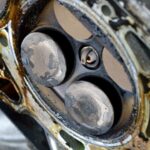
![Transmission Control Module Location [for Various Models] transmission control module location](https://roadsumo.com/wp-content/uploads/2022/12/transmission-control-module-location-150x150.jpg)
![Are BMWs Reliable? [What Are the Most Reliable BMW Models?] are bmws reliable](https://roadsumo.com/wp-content/uploads/2022/06/are-BMWs-reliable-150x150.jpg)
